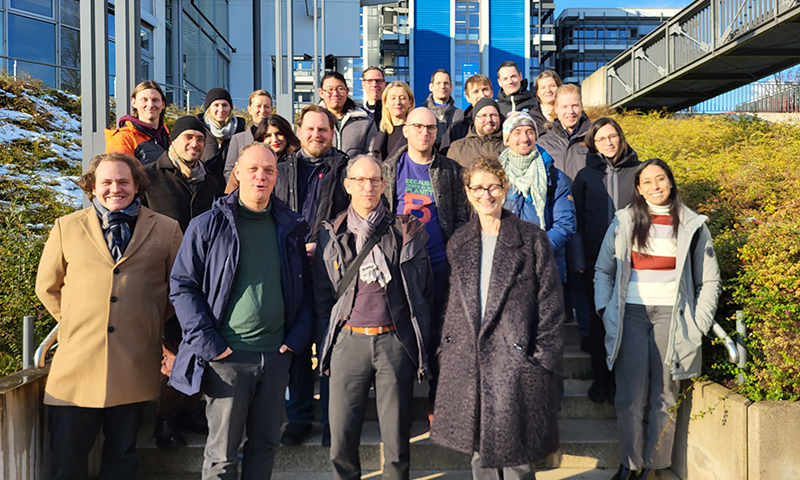News
IMPACT: Network meeting and new AI guidelines
[18.12.2023]Five universities, four federal states, one common goal: to improve higher education through the use of artificial intelligence and trusted learning analytics. The project partners from Frankfurt, Berlin and Bremen met in Hagen for a hybrid exchange at the halfway point of the IMPACT project.
 Photo: CATALPA
Photo: CATALPA
The project leaders Prof. Dr. Claudia de Witt (FernUniversität in Hagen), Prof. Dr. Hendrik Drachsler (Goethe University Frankfurt am Main), Prof. Dr. Andreas Breiter (University of Bremen), Prof. Dr. Niels Pinkwart (Humboldt-Universität zu Berlin) and Alexander Schulz (Freie Universität Berlin) brought their teams together at the joint meeting. They discussed the current state of development at their respective institutions and agreed on the upcoming project year.
Prototype tested in study from winter semester onwards
The participating universities are producing software and applications for later implementation at universities in three development lines. These lines are divided into: Chatbots, applications for formative feedback - i.e. continuous information on learning status and development, and summative feedback - i.e. the assessment of learning outcomes at the end of a course or module.
At the FernUniversität in Hagen, the IMPACT project is primarily concerned with formative feedback. It supports students in reflecting on their own learning process and accompanies them along the learning units in the Moodle learning environment. The Hagen project team also supports institutional framework conditions and the ethical development and implementation of didactically guided AI applications. With this expertise, the team has also contributed to the AI guidelines of the FernUniversität, which contain principles and guidelines for the use of AI in teaching and studies.
In the winter semester 2023/24, the Hagen team launched the prototype of a feedback center as part of a module in the B.A. Educational Science, which adapts over the course of the semester. One focus is on feedback literacy, i.e. the ability to understand feedback information and use it to improve one's own learning processes. "We will see the results of this after the evaluation in summer 2024," says CATALPA member Heike Karolyi. "During the joint meeting, Michael Hanses and Lars van Rijn presented and discussed this prototype. This enabled us to discover synergies and coordinate the upcoming studies once again," she reports.
Focus on institutional framework conditions, data protection and ethics
In two work packages, the IMPACT meeting focused on data protection, ethics and the institutional framework conditions for implementation at universities. The researchers also looked at processes at universities and discussed, for example, the significance of the AI-ACT , which is intended to establish a European legal framework for AI, for work in application development. "We already have very high standards in the areas of data protection and data use in the IMPACT project at FernUni. In addition to focusing on the anticipated AI Act in our AI tool development, we at FernUni are also at the forefront of development work with our pseudonymization concept and data ethics awareness," explains Claudia de Witt.
AI guide
Due to their scientific, but also very practical expertise in the field of AI and its implications for teaching and learning, CATALPA researchers Claudia de Witt and Heike Karolyi were recently also significantly involved in the development of a framework for dealing with AI at the FernUniversität in Hagen: The "AI Guidelines of the FernUniversität in Hagen" were developed under the leadership of the ZLI and recently adopted by the Rectorate. The document provides teachers and students with guidance on the use of AI in their everyday teaching and studies.
"This makes it much clearer for students and lecturers: the use of artificial intelligence, such as ChatGPT or Elicit, is permitted in principle if certain fundamentals are observed," says Heike Karolyi. This is because FernUni wants to "responsibly frame and implement a culture of enabling the open-technology use of AI for the university", the researcher continues. When using AI, for example, it is important that the technology helps to improve learning, teaching, research and work for everyone. This also makes it clear that further training opportunities, openness to technology, but also a critical and scientific view of the effects remain important. "Control and responsibility should always remain with the human actors, but transparency and knowledge about AI are essential. This fundamentally affects all areas of a university, which is a key player in science and society. Be it students who use AI tools for seminar papers or teachers who use the technology for lectures, as well as researchers who develop AI tools, they are all responsible for the quality of their respective work," explains Heike Karolyi.

